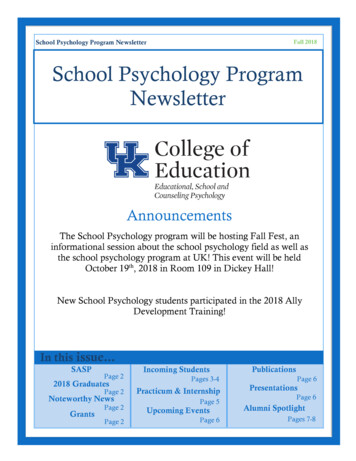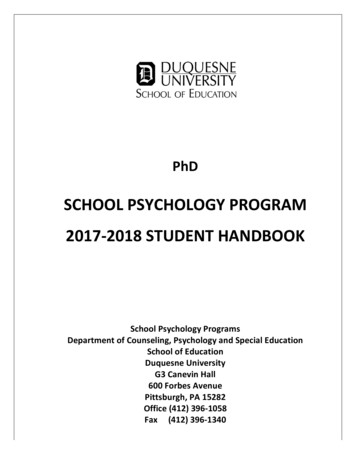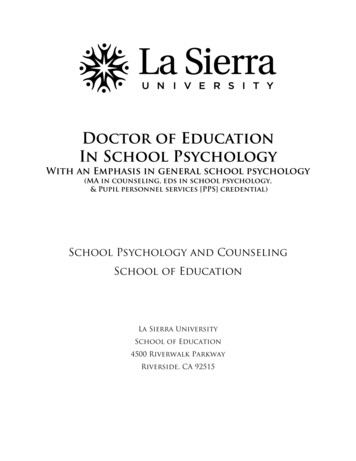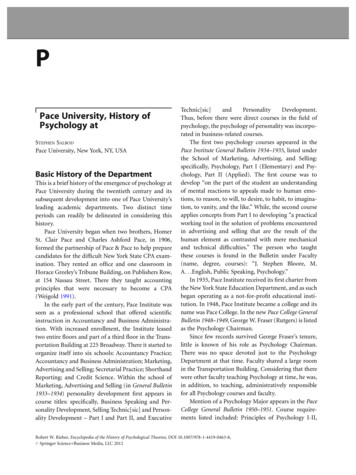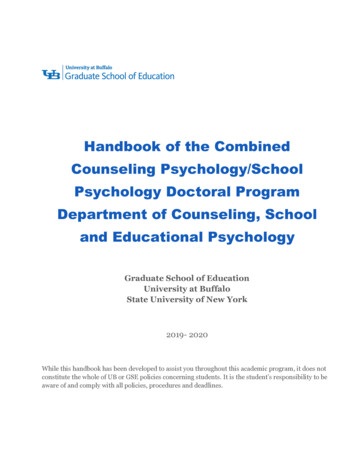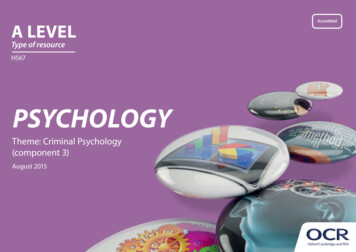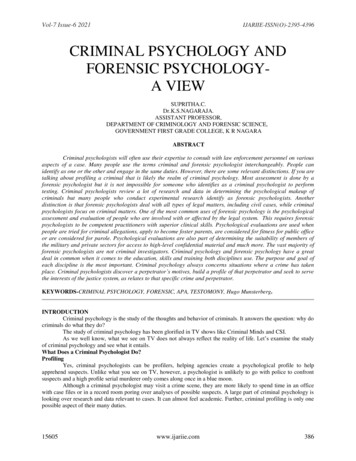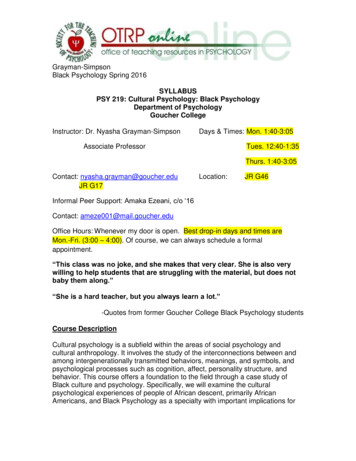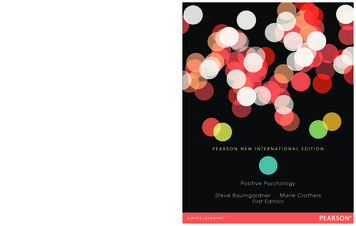
Transcription
UH SCHOOL PSYCHOLOGYNEWSLETTERFall 2018 Program UpdatesSpring 2018Volume 11 Issue 2EditorsDr. Keller-Margulis &Allison MeinertInsideProgram Update — 1Alumni Feature — 2Intern Feature — 3-4General Announcements — 5Fall 2018 - Volume 12, Issue 1Happy Autumn! Or as we call it in Houston “Second Summer”. We would like towelcome our newest cohort to the program. We are so excited to have you andcannot wait to see all the amazing things you do.In addition to our new cohort, there are some other new developments toshare. Thanks to the hard work of our faculty, we have several new opportunitiesfor additional training in bilingual service provision that will soon be availableto students. First, students will soonbe able to complete a concentrationin bilingual service provision that willinclude several additional coursesas well as specialized practicumplacements. In addition, we anticipatehaving our inaugural MexicoImmersion trip in the summer of2019. This will be a three-week program where students will travel to Queretaro(include appropriate character for emphasis), live with a host family, and spendtime volunteering in schools. Dr. Gonzalez has worked extensively with hiscolleague, Dr. Anita McCormick, from Texas A&M to organize the Mexico trip.Students who participate will be able to see how school psychology is practicedin Mexico and learn more about many of our students how have immigratedfrom Mexico.Finally, the School Psychology Student Association is currently beingformed, and students will be able to join soon! This organization will aim toprovide a greater sense of community among students and facilitate studentsuccess with increased mentorship, communication, and dissemination ofrelevant school psychology information. Thanks to the steering committee forstarting this organization!1
ALUMNI FEATUREASHLIE LLORENSQ: What is your current position and what roles/responsibilities does this entail?A: I am currently an assistant professor at Universityof Texas Health Science Center-Houston. I work in thePATH program, which is an intensive outpatient programthat serves youth with chronic medical illnesses andpsychological comorbidities. My primary responsibilitiesinclude: direct clinical intervention in the forms ofindividual, group, and family therapies; managing researchdata; staff consultation; and practicum student supervision.Q: Where are you from?A: Houston!Q: What degrees do you hold and where did you receivethem?A: BS-Psychology-Baylor, Med-Counseling-UH, PhDSchool Psychology-UHQ: Where did you do your internship?A: Nebraska Internship Consortium in ProfessionalPsychology. My site was the Munroe-Meyer Institute atthe University of Nebraska Medical Center, and I wason the Behavioral Pediatrics and Integrated Care Track.I was placed in primary care clinics within the greaterOmaha area, other experiences included doing testing forpsychoeducation evaluations for the public school districtand co-leading a social skills group.Q: Who is/are you hero(es) in psychology?A: Tough question, because no names that instantly cameto mind. The people who I have come to admire in theFall 2018 - Volume 12, Issue 1field of psychology, are people who have shown me thatestablishing rapport and humanizing experiences for thechildren and families we work with is just as important asthe evidence based treatments that we learn about.Q: Any psychology related books you’d recommend?A: The Boy Who Was Raised As A Dog, was one of the firstpsychology related books I read in undergrad, and sparkedmy interest in learning more about child development andbehavior.Q: What advice do you have for current students?A: Practice Self-Care!!! So much easier said than done,I know! Ask for help, Protect your time and energy fromunnecessary things/people, Practice setting boundarieswith things that are not necessary for your progress,Enjoy the complexities that come with juggling life and ademanding grad program--Don’t postpone “life” until afterthe PhD.Q: What is your favorite part about being a schoolpsychologist?A: Being outside of a school setting, my favorite part ishaving the knowledge to educate parents about schoolsupports, and helping them change the nature of theirrelationship with the schools, if necessary.Q: What do you like to do in your free time?A: I enjoy spending time outside and being with my family.I’m a big kid and enjoy being active, so, I may be with myboyfriend and dog at a dog park, playing soccer with mylittle brother, working out, or challenging my little cousinsto a game of dodgeball at a trampoline park.2
INTERN FEATUREMADELINE RACINEQ: What degrees do you hold?A: I earned a B.A in psychology from Texas A&M. I alsohold a M.Ed. in Counseling from University of Houston,which I earned partway through the program.Q: Where are you doing your internship and what doyou do day to day?A: I am completing my doctoral internship at Baylor Collegeof Medicine/Texas Children’s Hospital within the ClinicalChild/Pediatric Health Psychology track. My focus thissemester is providing services for preschool populations(ages 2-6 years), including diagnostic evaluationand conceptualization, interventions with pediatricpopulations (e.g., pediatric cancer, transplant patients,medical trauma), and short-term parent managementtraining for typically developing children who presentwith disruptive behaviors, sleep problems, eating concerns,and elimination disorders. I currently have about 15preschool patients on my caseload who I see for outpatientfamily therapy or during their medical appointments. Ialso conduct a few diagnostic intakes a week for preschoolage children with various concerns Additionally, I consultwith physicians, nurses, and medical staff involved in achild’s medical care. I spend one day a week at the AutismCenter conducting psychological evaluations for childrensuspected of having ASD. These evaluations includeconducting in-depth parent interviews, cognitive and preacademic testing, ADOS-2 assessment, providing feedbackand recommendations to the family, and consulting withdevelopmental pediatricians. Next semester, my focus willshift to Pediatric Health Psychology, serving children andFall 2018 - Volume 12, Issue 1adolescents who are having difficulty managing physicalsymptoms, adapting to chronic/acute medical conditions,and/or adhering to medical regimens. I will also completea minor in the OCD and Anxiety Disorders Program,providing assessment and intervention to children andadolescents with OCD, health anxiety, panic disorder,selective mutism, and social phobia.Q: What was your favorite class in the SP program?A: My favorite classes were Eco-Behavioral Interventionswith Dr. McQuillin and Professional Seminar with Dr.Mire.Q: Who is/are your hero(es) in psychology?A: I consider myself a behaviorist, so I would have to sayB.F. Skinner and Ivar Lovaas. I would also say Jean Piagetbecause I am very developmental in my approach to childclinical work. I also have to give a shutout to Dr. Mire. Sheis my own personal psychology heroI admire her teachingand supervision style, her commitment to students and themeaningful relationships she develops with them, and herdedication and commitment to being a life-long learnerand well-rounded school psychologist.Q: Any psychology related books you’d recommend?A: Handbook of Pediatric Psychology, NeuroTribes: TheLegacy of Autism and the Future of Neurodiversity bySteve Silberman, Parenting the Strong Willed Child by RexForehand, Ph.D., and Nichoals Long, Ph.D., and Freeingyour Child from Anxiety by Tamar Chansky, Ph.D. Thelatter two books are written for parents and are ones IContinued.3
Continued from previous page.often recommend to families I work with. Both have beenincredibly useful within my clinical practice in providingan overview of evidence-based assessment and treatmentfor disruptive behaviors and anxiety.Q: What do you like to do in your free time?A: I enjoy cooking, running, and spending time with familyand friends. I have absolutely loved living in Houston forgraduate school and internship and enjoy exploring all thegreat things the city has to offer.Q: What advice do you have for current students?A: My first piece of advice is to say yes to as many clinicalwith family or friends, or just taking a much-needed breakfrom checking your email.Q: How would you describe being a practicing schoolpsychologist at your site?and research opportunities that come your way. It will not A: My training within the UH School Psychology Programonly build up your CV with many diverse experiences, but has provided me with specialized training in childwill also help you further develop your interests and future development, school and family systems, consultation, andcareer path. Similarly, I would advise students to keep an behavior assessment and intervention, which has provenopen mind as they continue to gain new experiences and to be invaluable so far on internship. While I am notto not worry if their interests are still broad or if they are practicing as a traditional school psychologist in a schoolnot yet sure of their long term goals. It took me almost setting, I frequently provide families with informationfour years in the program with many different practicum regarding school services and supports including earlyplacements and research labs before I figured out my specific intervention, special education, 504 plans, and behavioralinterests, passions, and long term goals, and these continue supports in order to help them navigate the school systemto evolve today. My second piece of advice is to build and I often consult with teachers and school staff regardingmeaningful relationships with your advisor, the faculty, my patients. I also frequently make individualizedyour supervisors, and peers and continue to network and recommendations for a child across the home andmake connections within the field. Take advantage of the school setting when I am conducting diagnostic intakesmentors you are surrounded by and aim to make a positive or comprehensive psychological evaluations. As mostimpression with everyone you meet, as the psychology school psychologists, I continue to take an eco-behavioralworld really is so small and you are never know who you approach to case conceptualization and continually aimare going to work with in the future and who will help you to enhance communication between the multiple systemsforward your career. My last piece of advice is to remember that surround a child, most notably the family, school, andto engage in self-care. Graduate school is incredibly busy, healthcare systems.but I have learned from experience that it only gets busier.Q: What is your dream vacation?Starting to put self-care at the top of your to-do list will beimportant moving forward and helping you learn to manage A: I’ve always wanted to take a west coast road tripstress and prevent burnout. Additionally, take advantage of where I could visit different beaches, coastal towns, andbeing a graduate student and having a somewhat flexible national parks like Yosemite, Channel Islands, and theschedule with vacation breaks. This is something I wish I Grand Canyon, to name a few. I would also love to visithad done more of now that I am somewhat in the real world Thailand to enjoy the white beaches, wildlife, spicy food,with normal work hours and vacation days. Enjoy those and rich culture. Vietnam is also on my bucket list so I canspring and summer breaks, whether it be traveling, visiting experience eating the best pho in the world for breakfast,lunch, and dinner.Fall 2018 - Volume 12, Issue 14
General Announcements Mark your calendars: Interview day is January 25, 2019! More information about the Mexico Immersion trip will be coming soon! It’s not too late to be involved with SPSA! Contact Amy Barton if you are interested in helping out thesteering committee. Don’t forget to register for the NASP annual meeting in Atlanta, Georgia in February 2019 if you plan onattending!Be sure to follow the UH School Psychology on social media for events and announcements!uofhSPSYuhschoolpsychCheck out the UH School Psychology Ph.D. Program video using this URL:https://www.youtube.com/watch?v roRd-yMsPZYCOLLEGE OF EDUCATIONSchool PsychologyProgramUniversity of HoustonCollege of EducationPsychological, Health,& Learning Sciences491 Farish HallThe School Psychology Program at the University of Houston is accredited bythe American Psychological Association. The Program adheres to a scientistpractitioner training model, and is committed to developing professional schoolpsychologists who are competent to engage in applied research and ecologicallysensitive evidence-based practice (i.e., students learn to apply critical analysisand inquiry to identify, select, implement, and evaluate evidence-based practiceswith sensitivity to cultural and linguistic considerations, and in consideration ofdiverse client preferences). Sensitivity to diversity issues is addressed in specificcourse work and embedded throughout the training experience. Awarenessof diversity issues is ensured because UH is one of the most culturally andlinguistically diverse research institutions in the nation.
A: BS-Psychology-Baylor, Med-Counseling-UH, PhD-School Psychology-UH Q: Where did you do your internship? A: Nebraska Internship Consortium in Professional Psychology. My site was the Munroe-Meyer Institute at the University of Nebraska Medical Center, and I was on the Behavioral Pediatrics and Integrated Care Track.
